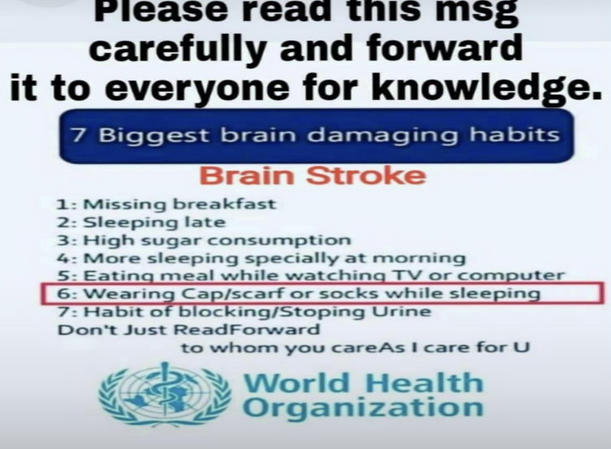
Claim: A viral graphic on WhatsApp asserts that the WHO has released a list of seven habits that lead to brain stroke.

Verdict: False. The viral graphic presenting seven habits that lead to brain stroke is false and does not originate from the World Health Organization (WHO).
Full Text
A flyer with the WHO logo at the bottom, making questionable claims, has gone viral on social media. The flier comes with a caption stating, “Please read this message carefully and share it with anyone for awareness”.
It states further: “7 Biggest brain-damaging habits.”
The infographic features the WHO logo at the bottom, accompanied by a caption that reads, “Please read this message carefully and share it with anyone for awareness.”
It states: “7 Biggest brain-damaging habits. Missing breakfast, sleeping late, high sugar consumption, excessive sleeping especially in the morning, eating meals while watching TV or using a computer, wearing a cap/scarf while sleeping, and the habit of blocking/stopping urine,” concluding with a quote; “don’t just read, share with those you care about as I care for you.”
The flyer has sparked controversy about whether the content is genuinely from the WHO, the world’s leading and most trusted source of health information.
DUBAWA decided to investigate to determine its authenticity.
Verification
Initially, DUBAWA investigated whether the WHO had officially released the graphic above or any of its content as the primary causes of brain damage.
While the WHO and other health organisations have warned about the adverse effects of some of the activities listed, we did not find any specific reference to such a list or graphic attributed to the WHO.
A comprehensive investigation across various sources confirmed that the post is not coming from WHO.
The exact text can be traced back to a post dated Oct. 7, 2020, on this site.
We also found multiple articles regarding the claim in various credible fact-checking reports where it was disproven.
In a report dated Oct. 12, 2020, AFP stated it had consulted a WHO representative who debunked the graphic.
According to a report on the WHO website, various factors contribute to brain damage related to physical health, healthy environments, safety and security, lifelong learning, social connections, and access to quality services. These factors all influence how our brains develop, adapt, and respond to stress and adversity.
Our investigation further uncovered several social media posts regarding the claim published by individuals without any verification. Read here, here, and here.
The misleading claim has also been debunked by other fact-checking organisations globally in 2020.
What causes a brain stroke?
To find more about what causes a brain stroke, we did extensive research online from credible sources.
We also came across a 5-minute video on YouTube four years ago by Roham Moftakhar, a Chief Neurologist at Prisma Health in Columbia, explaining the causes of the different types of brain stroke and how they occur.
A brain stroke is caused by a disruption in blood flow to the brain, leading to two main types: ischemic stroke, caused by a blockage like a blood clot or plaque buildup, and hemorrhagic stroke, caused by a blood vessel rupturing or bleeding.
Risk factors for stroke include high blood pressure, high cholesterol, smoking, diabetes, and irregular heartbeats like atrial fibrillation.
Conclusion
Based on evidence gathered from various sources, the viral graphic revealing seven habits that cause brain stroke is false and does not originate from the World Health Organization. There is no scientific proof that the seven listed habits have a direct link to brain stroke.
 Côte d’Ivoire : la présidente du Sénat victime de désinformation
Côte d’Ivoire : la présidente du Sénat victime de désinformation  Une vidéo sortie de son contexte pour jeter le doute sur la transparence du vote en Côte d’Ivoire
Une vidéo sortie de son contexte pour jeter le doute sur la transparence du vote en Côte d’Ivoire Weekly round-up: Trending claims DUBAWA verified this week
Weekly round-up: Trending claims DUBAWA verified this week Une vidéo manipulée pour prétendre à un soulèvement dans le Nord de la Côte d’Ivoire
Une vidéo manipulée pour prétendre à un soulèvement dans le Nord de la Côte d’Ivoire